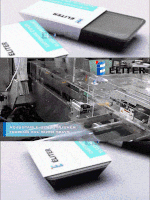Tetra Pak and Trans Sabater sign an agreement for the mechanical recycling of polyethylene and aluminum packaging
2023-06-15
Tetra Pak and Trans Sabater have signed a collaboration agreement for the implementation of mechanical recycling of polyethylene and aluminum waste from recycled beverage cartons in Spain to help meet the European Union’s goal of recycling and efficient waste management.
Therefore, the collaboration has the objective of consolidating the efficiency and economic viability of the mechanical recycling of aluminum and polyethylene for its subsequent revaluation in other areas of industrial activity. As a result of this agreement, Trans Sabater will initially recycle 3,000 tons of polyethylene and aluminum waste and transform it into pellets through its own patented process. In the following months, if the development of the project is satisfactory, the recycling capacity of these materials will be expanded, which will mean an important step forward to consolidate the mechanical recycling of polyethylene and aluminum of cardboard containers for beverages in Spain.

In this sense, Trans Sabater has developed formulations to make recycled compounds and be able to optimize the characteristics of the final product. First of all, the material is crushed and a magnetic removal of metal parts is carried out. Then, the mechanical washing combined with water is started, to separate the different fractions. Finally, the plastic is extruded and compacted to produce, as a result, the pellet.
It is a 100% recycled secondary raw material, very versatile with multiple advantages. For example, it has unique properties, thanks to the combination of the different plastic materials and the aluminum that it makes as an additive optimizing its thermal properties, which increase productivity in the plastic transformation processes. Additionally, being a 100% recycled material of post-consumer origin, it is exempt from the plastic tax, which provides a potential tax benefit for the industry that acquires it. It also has a very colorful metallic finish that allows dyeing in different shades.
With regard to the recirculation of this secondary raw material, there are different potential applications: logistics (pallets, boxes), packaging (caps, containers), in retail (baskets, carts, shelves), also in tooling (agricultural or construction utensils), furniture (urban, industrial, outdoor), and gardening (pots, pipes). Depending on the final application and the technical needs of the customer, Trans Sabater offers different types of solutions in its portfolio, with facilities prepared to make specific compounds by adding various fillers.
Ramiro Ortiz, Managing director of Tetra Pak Iberia, says: “We are very pleased with this agreement. Collaborative innovation is key to efficient waste management and it is essential to join forces to achieve it in a sustainable way. As a packaging industry, we have a responsibility and a commitment to move towards the dual objective of maintaining food safety, while protecting the planet. The collaboration with Trans Sabater is another step towards a high-quality and economically viable recycling of all the materials in our packaging.“
The signing of this agreement also coincides with the launch of the third edition of the Choose Nature campaign. Choose Tetra Pak Cardboard in which the commitment to circular solutions is one of the fundamental pillars. “Tetra Pak’s main objective is to achieve a cardboard packaging for food and beverages, made entirely from renewable or recycled materials, obtained in a responsible way, that is fully recyclable and carbon neutral,” adds Ramiro.
For his part, Pablo Sabater, industrial director of Trans Sabater, adds that “the mechanical recycling of polyethylene and aluminum waste is not only positive for the aseptic carton packaging industry, but also expands the horizon of opportunities for any type of industry through the consolidation of a secondary raw materials market with various applications and operational advantages. We are very proud to be part of such ambitious projects and to help solve some of the challenges that the future poses to us. Thanks to our patented process, we have managed to significantly reduce water consumption in recycling processes compared to traditional processes and offer a high-quality 100% recycled material. Since we started working with this material we saw many possibilities and, thanks to the collaboration with Tetra Pak, today it is a reality. We are convinced that this is just the beginning of the implementation of a new efficient and sustainable industrial process that helps to reduce the need for primary resources.”




